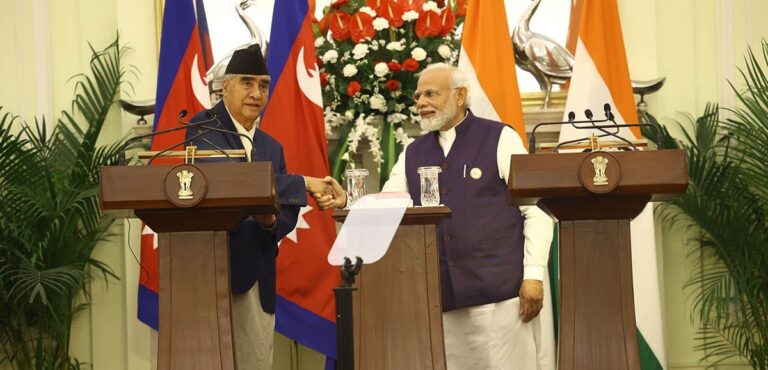
The private sector industrialists and businessmen of Nepal and India have claimed that Prime Minister Sher Bahadur Deuba’s three-day visit to India has been highly productive and successful.
They believe that the prime minister’s visit that took place amidst a myriad of problems in the trade and business sector between the two close South Asian neighbours due to the absence of dialogue at the highest political level over the last some years has helped enhance mutual understanding.
Also, the agreements of significance in the electricity and transportation sectors will make an important contribution to the economic development of Nepal in days to come.
Moreover, the three-day official visit has paved the way for the governments of both countries for increasing Indian investments in Nepal and facilitate exports to India.
During an interaction with Indian businessmen during his visit, PM Deuba encouraged the Indian investors, industrialists and businessmen to invest in the energy, infrastructure and tourism sectors as Nepal has a suitable investment environment. The Prime Minister said that he had come on an official visit to India for strengthening the mutual historical relations between the two countries and for holding discussions on matters of bilateral economic cooperation. He expressed the belief that Nepal-India ties would gain new heights with his visit.
On the occasion, he called on the private sector to participate in the nation’s development, saying the time has come for all Nepalis to once again come together for charting out a road map for a prosperous nation by keeping the broader economic and social interests of Nepal at the centre.
Addressing the programme organized by the Confederation of Indian Industries (CII) in New Delhi, Federation of Nepalese Chambers of Commerce and Industry (FNCCI) president Shekhar Golchha, who was a member of the Prime Minister’s entourage, said there is immense possibility for investment by Indian industrialists and businessmen in the hydropower, tourism, production-based sector and information technology areas among the service sector of Nepal.
He added that Nepal’s private sector would facilitate increasing Indian investment in the context of its decline in recent years. Golchha underscored that the multinational companies investing in Nepal were making decent earnings.
CII President TV Narendran said, “Now Nepal is one of the attractive destinations for Indian investors.” A few years back, Nepal was enduring internal conflict, political instability and the electricity crisis and the COVID-19 crisis in the past two years had its implications on the building of an investment-friendly atmosphere, he said, adding there was no such situation now.
According to him, India’s visit by Nepal’s Prime Minister has been contributed to the enhancement of cordiality at the political level and this has inspired the Indian business community to increase investment in Nepal.
On the occasion, he announced the cooperation from the CII’s energy mechanism for promoting investment in Nepal and quality in the export of agri-products.
The programme was attended by around 30 multinational companies in India where CEOs from around 15 companies expressed their concerns and shared their experiences about the investment potentialities in Nepal. As they assessed, Nepal offers opportunities for investment in big projects relating to IT, infrastructure and hydropower.
During a discussion between the office-bearers of FNCCI and CII, Indian investors put their queries about the promotion of cooperation in investment, implementation of the joint projects and Nepal-India investment and trade facilitation among others.
FNCCI senior vice president Chandra Dhakal said Nepal enjoyed India’s continuous support in multi-sectors including economic, social and political and as he explained, Nepal could reap benefits from the progress that India achieved from Modi’s ‘visionary’ leadership.
“No nation could achieve prosperity in absence of cooperation between the public and private sectors,” he said, expressing hope that the creation of investment-friendly at home would attract foreign investment.
“Potentialities have been increasing in Nepal’s tourism sector and existing tourism infrastructure will be insufficient in the next two years,” he said, adding that investment in the tourism sector had been easier due to the government policy.
This visit of the PM has achieved a breakthrough in hydropower, a sector that has been struggling to yield results for 40 to 50 years, argued hydropower entrepreneur Gyanendra Lal Pradhan.
The willingness of India to purchase energy from Nepal would help the country find a market for its energy, he said.
Stating that Nepal has traditional relations with India and was searching for ways to increase its export to India, the Indian business community stressed the need for India to facilitate Nepal’s export to the neighbouring country and third countries.
In the meeting, they discussed issues including carrying out infrastructural reforms at the transits between the two countries and removing non-tariff barriers and establishing a lab to check the quality of agricultural products and validating lab tests of the products carried out by both countries.
During the PM’s official visit to India, the first one since COVID-19 struck, Nepal should stress the need for implementing various projects, said Mahesh Jaju, Chairperson of the Jaju Group.
“India should help Nepal to reduce our trade imbalance by increasing the exports of goods,” he said.
Source : RSS,






